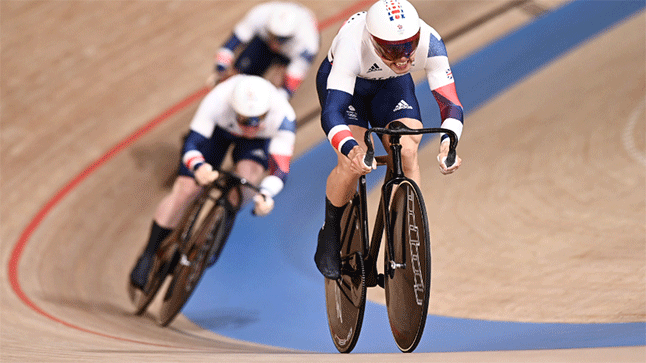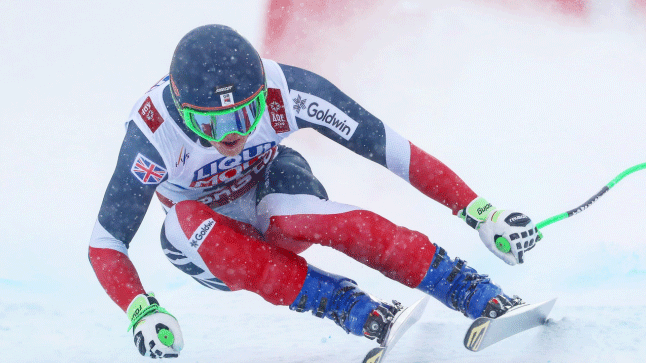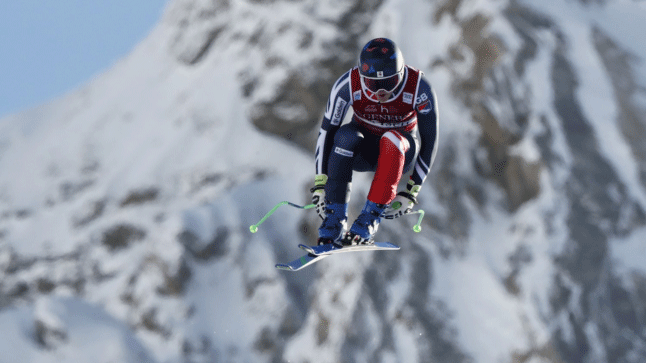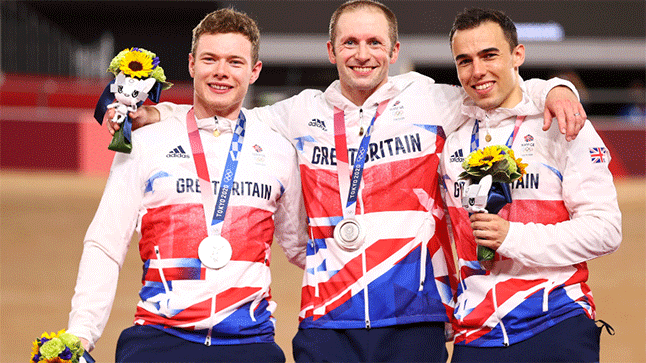Lessons from Olympians: two MBA students share their stories
Ryan Owens and Jack Gower, LBS MBA graduates and Olympic athletes, share their experiences and lessons on succeeding in sport and business

Ryan Owens and Jack Gower are atypical LBS graduates. The path that brought them to the MBA programme is, to put it mildly, unusual.
Both men are professional athletes and Olympians. Jack placed 12th for Ireland in the alpine skiing competition at the 2022 Beijing Winter Olympics, while Ryan picked up the silver medal for Great Britain at the 2020 Tokyo Olympics, breaking existing records at the men’s cycling team sprint.
Preparing for the Olympics and making their mark as world-class athletes in their respective disciplines takes unwavering and single-minded dedication to the sport; a relentless and often gruelling regime of training and self-discipline that characterises both men’s lives.
Ryan grew up with cycling in his DNA. His father competed on grass in the Highland Games during the 80s, and his grandfather routinely cycled 250 miles a day to court his grandmother while stationed in the army in Bedfordshire—a love of long-distance cycling that endured long into his 70s.

“Cycling has always been part of my family, and I knew from the age of 14 that I wanted to do this professionally,” says Ryan. “Getting my spot on the Olympic team has taken huge commitment. We were competing during Covid, which meant I had to train every day –even from the tiny 42m basement flat I was sharing with my fiancée, which was bedlam!” he laughs.
Commitment to his sport also saw Jack training relentlessly from a very young age. That and playing his part in bringing together the requisite talent and sponsorship to get his team to the Olympics.
“Between training and organising, I spent my career totally dedicated to skiing,” he says. “From finding sponsors to hiring coaching and the right staff to bring us on, it’s a full-time commitment. And competing in Tokyo with the threat of Covid meant training in segregation; even eating in small glass boxes, and then competing in front of a handful of supporters, which was strange but still a wonderful experience.”
Discover fresh perspectives and research insights from LBS
“Making the transition from sport into something new and different meant finding a conduit to new knowledge, skills and competencies”
For both men, training and competing as professional athletes at the very top of their game has also meant certain sacrifices—among them, a conventional university education.
Professional sportsmen and women enjoy exhilarating, but also short careers, says Ryan. In both cycling and skiing, the majority of professionals retire in the late 20s or 30s—just as their contemporaries are building the bedrock of their careers. Making the transition from sport into something new and different meant finding a conduit to new knowledge, skills and competencies; something that both Ryan and Jack took on with the same resolute determination and commitment that has characterised their careers as athletes.
“As an athlete you know you’re on a limit careerwise. I decided to work with a career coach relatively early on and look at what I could apply from my skills in cycling. At the same time, I’d helped a friend start up a therapy business as a side project, which was something I really enjoyed. In passing, he mentioned that I should consider doing an MBA,” says Ryan. “But without an undergrad degree I just didn’t think it was an option.”

A new path
A chance visit to the LBS website changed his mind. Reading that applicants were welcome from “unconventional career experience,” including military and sports professionals, Ryan decided to try the GMAT and put in an application to the MBA.
“Talking to the admissions team, I got great feedback about going for it, so I started working towards my GMAT in the build-up to the Olympics. When you’re training and competing, your energy and mind are highly focused but there’s still plenty of downtime. And having another goal alongside the cycling was hugely helpful and motivational. It felt like other doors were opening.”
Jack meanwhile had been busy putting his energy to good use even before the Olympics. Conscious that retirement from sport was looming, he had made the decision to set up his own company, online VR game, The Fitness Resort.
“I knew I needed something to retire into and setting up my own company meant I would be salaried and would have credibility to go for the GMAT and ultimately into the MBA at LBS. I didn’t want to simply be a retired athlete. And I knew that doing the MBA was a fast track to an even footing with my peers.”
From the Olympics to LBS
Doing an MBA is a perfect option for former athletes, says Ryan. Anyone doing an MBA in their mid-20s to mid-30s is likely to be looking for a change or a new beginning, which provides common ground. And although daunting at first, he quickly found his stride as part of a supportive cohort of like-minded friends.
“You always rely on a new side of yourself when you step into a new environment, but I just clicked with my study group immediately and it all fell into place. For me, going in without a structured educational background meant that what I was learning really hit me –and in interesting ways that I was able to relate to my experience, even as I started building new skills.”
“There is common ground between professional sport and the MBA experience, and it’s team spirit”
For Jack, the chance to apply new tools from the MBA directly to his own business created palpable and immediate impact; a wonderful learning experience, he says—and one also enriched by the support of his study group.
“It was amazing being able to implement so much of the learning. From marketing to data analytics to finance—there’s just so much that was interesting and pertinent. For me it was a sharp learning curve, but I enjoyed the complete support of my peers, many of whom have gone on to become close friends.”
Lessons from Olympians
There is common ground between professional sport and the MBA experience, says Jack; and it’s team spirit. The effort that goes into building and leading a team as an Olympic athlete is not dissimilar to the dynamics that played out during his time at LBS.
“The better your team, the better your performance and the better your career,” he says. “And that’s true whether you’re competing at the Olympics or taking your MBA at LBS. For me, being part of a strong cohort in a top school, seeing how they function, communicate, work together and progress, it just lifts your own performance.”

Ryan agrees. And he sees parallels in terms of risk-taking and planning.
“Anyone choosing a career in sport or choosing to do an MBA is thinking about how to build everything to get to where you want to be. Taking an MBA for many is a brave decision: it’s about stepping away from a safe career, be that in business or sport or as an entrepreneur and following a new path to reach your goal.”
Reaching that goal is down to two things, says Ryan. The first is to keep an open mind and to prioritise curiosity. Opportunities emerge from the least likely places at times. He cites the random conversation with his friend to pursue the MBA, and a conversation with a classmate that led to an internship following the degree; one that will help him segue into a new role at McKinsey this summer.
“People often say to young people that the key to success is about chasing your dreams. But I don’t think it’s as simple as that. I’d say: within reason, always work hard towards achieving your goals, whatever they are.”
“It’s about keeping your eyes open to things that might just come up. And then being ready to pursue the opportunity, if there’s even a glimmer of interest, till you find the truth of it—till you know if you want to do it or not.”
Then there’s knowing what you can control, and what you can’t.
“Throughout the entire MBA, there is a lot of noise going on around you, and some of it will be out of your control. The thing is you can only perform your own performance. I’ve tried my best to leave a more positive than negative impression on those I have met – I can't control how they see me but I do my best. And the same principles apply in a sporting career. At the Olympics, we set a new record, only to see it broken by the team after us. If I’d been tied up the circumstances and the gold medal, it could have crushed me. But I learned to simply focus on my own performance; to focus on what I can control.”

Jack, meanwhile, is adamant about the power of “elbow grease.”
“I really believe that working hard when you are young is the bedrock your success, whether that’s in sport or in business. If you put in the effort to get good at something after school or university, the effort compounds quickly and it pays off. People often say to young people that the key to success is about chasing your dreams. But I don’t think it’s as simple as that. I’d say: within reason, always work hard towards achieving your goals, whatever they are.”
What the future holds
Ryan has just completed an important internship with Team GB, helping the organisation with strategy as they prepare now for the LA Games in 2028. The experience has been an excellent conduit for his new career in consulting with McKinsey—an opportunity he is keen to embrace. Later this year, he will marry his partner and many of his LBS classmates will be in attendance. In the meantime, he will be competing in the Paris Olympics in July.
“It’s been a roller coaster year for me. I’m still in training for the Paris Games, just completed my MBA, starting my new career and I’ve just booked a wedding venue for the autumn,” he laughs. “I managed to frontload my MBA and build up credits early, just to make time to fit it all in!”
Jack is similarly indefatigable. He plans to continue with his company and has signed up to take the Chartered Financial Analyst programme at the CFA Institute—a decision partly sparked by the discovery that he loves studying.
“I really enjoyed my MBA experience, and I want to keep going and to build fluency and understanding of finance which is such a key element of any company. I loved studying and I want to keep going—building new skills and new experience outside of the world of sport,” he says. “I have the time to combine work and study in the evenings and at weekends. And I’m just no good at sitting still!”
